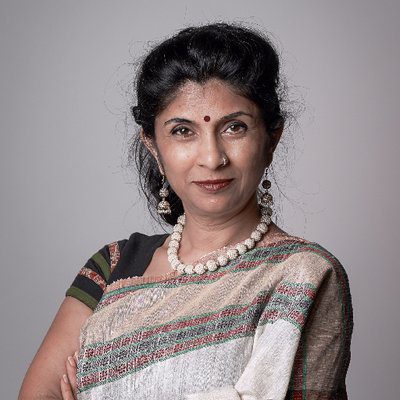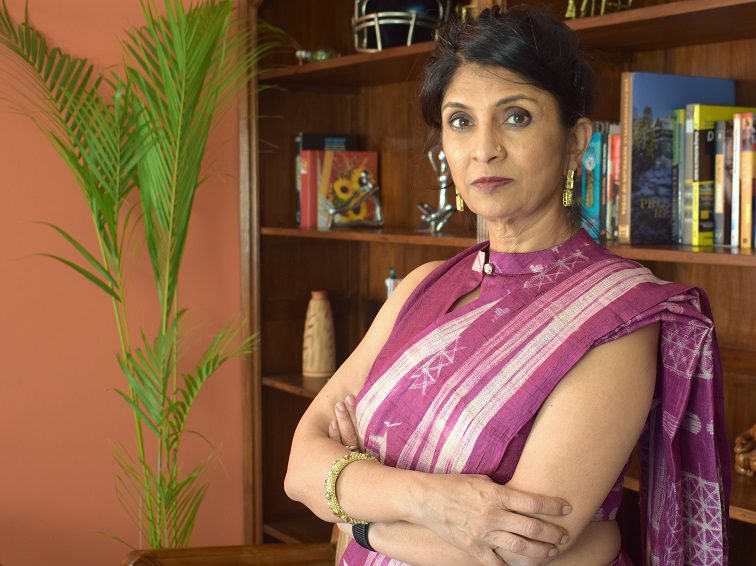(September 22, 2021) She has always believed in breaking the glass ceiling: from being one among six women in a batch of 400 engineering students to becoming a serial entrepreneur and eventually founding Kalaari Capital, an early-stage venture capital firm based in Bengaluru. Vani Kola has always believed in doing things differently. Today, many of her investments have become successful — Cure.fit, Myntra, Snapdeal, Dream11, Urban Ladder and YourStory. As a technology focused investor, Kola has a penchant for picking the best young minds and mentoring them to build successful enterprises.
The 57-year-old has invested in over 90 firms and has behind her 22 successful years as an entrepreneur in Silicon Valley. Ranked as one of Fortune’s Most Powerful Women in Business, Kola focuses on working with entrepreneurs to build high-value enterprises. What sets her apart is the fact that she continues to remain accessible to her founders and her investment philosophy includes recognizing and mentoring ambitious first-time entrepreneurs.
Practicing meditation regularly has enabled the journey of self-discovery for myself. It helps me destress and find inner tranquility. On this International Day Of Peace, let's spread positivity and serenity by dedicating a few minutes to simple meditation practices. pic.twitter.com/2kDAFI7UeW
— Vani Kola (@VaniKola) September 21, 2021
From India to the world
Born in 1964 in Hyderabad, Kola believed in doing things differently. A student of electrical engineering at Osmania University, she was one of six girls in a batch of 400. She then moved to the US to pursue her Master’s from Arizona State University in 1985; this was at a time when few women were pursuing the stream. She subsequently moved to California where she founded her first startup RightWorks in 1996. The company helped firms manage global procurement and she eventually sold RightWorks for $567 million and went on to found Certus Software in 2001.
However, her journey wasn’t an easy one. Riddled with gender bias, this Global Indian was often subjected to pointed questions from male colleagues. According to an article in the Vogue, a male acquaintance once asked her if she didn’t feel guilty for leaving her less than a year old daughter at home as they embarked on a business trip. “It occurred to me ‘oh wait, didn’t his wife just have a child and wasn’t that child only 6 weeks old’? Yet he was here at the airport also leaving to go somewhere. It just doesn’t occur to men! You just have to develop tools to cope,” Vani told the magazine.
The turning point

Vani Kola
It was Kola’s grit and determination that helped her sail through her entrepreneurial years and forced Fortune 500 CEOs to sit up and take notice of her work. When she sold Certus in 2005, Kola found that she had plenty of free time and it was now time for the then 40-year-old to evaluate life. The entrepreneur who’d never once been on a solo trip, decided to go to Hawaii where she took a step back to think about what it was that she wanted in life. This trip proved to be a turning point for the entrepreneur, who decided that it was time for her to move back to India where she could see the changes brought about by economic liberalization. “I know this sounds dramatic but I was reminded of Jawaharlal Nehru’s midnight speech. I felt an economic awakening in the country. There was unbridled aspiration!” she said.
Back to home base
By 2006, Vani was ready to move back to India, having seen how much the country had changed. She set up IndoUS Venture Partners with serial entrepreneur Vinod Dham and former head of Intel India Kumar Shiralgi. By 2011, the company was rebranded as Kalaari Capital and began focusing on early-stage investments.
Kola had always had a knack for gauging where the opportunity lay in the startup space and encouraged entrepreneurs to see where the tail winds were before drilling into a sector. At one of her talks with Deep Kalra of MakeMyTrip in a virtual event, she said that at Kalaari they had anticipated 4G to come earlier and had thus supported businesses that were building for that tailwind. However, it is also important for entrepreneurs to do their research to be able to effectively tap into the trends.
The power of #personalization is often not leveraged enough.
When you make the time to reach out to your audience with an authentic message and genuine value, the dividends accrue. (1/2) pic.twitter.com/RcmP9tP6yv
— Vani Kola (@VaniKola) September 21, 2021
Today, Kalaari works to empower visionary entrepreneurs to build unique solutions that reshape the way Indians live, work, consume and transact. On their website Kola writes, “What inspires me the most is creating impact, and making a difference, through innovation and entrepreneurship. I am proud of the values that Kalaari stands for and our commitment to entrepreneurs. It is a privilege to be part of rethinking the future, alongside our entrepreneurs.”
Kalaari began operations as a $150 million fund and over the years has made investments across e-commerce, gaming, digital content, and healthcare sectors. Kola believes that India’s digital opportunity is still at a nascent stage and there is tremendous scope for the country’s venture capital industry to support aspiring entrepreneurs.
The pandemic and its effect on India
In an interview with Business Line, Kola said that the pandemic has accelerated the country’s digital signature and companies dependent on the digital economy have benefited significantly. “In the first few months of this year (2021) itself, we have seen about $6.5 billion of growth investments come into these firms. The digital acceleration favors the startup community because they are the ‘disruption economy’… The crisis is also sometimes an opportunity, as the startup ecosystem has been vibrant in the first quarter, with close to 300 companies getting funds. There is definitely sunshine on this industry.”
However, on the heels of every successful startup is also a failure, a part of the game. Kola equates startups to extreme sports and says that one should expect significant failures in the game. “Idea-to-execution, and founder-to-leader are journeys, and the fascination is because it is a great story – a David and Goliath story. It is about human triumph and human vulnerability. At least 50 per cent of the companies will not even get any funding, and of the remaining that get funding, maybe 25 per cent will reach a meaningful scale, of which only 10 per cent will hit home-runs.”
Giving women entrepreneurs an impetus
Kola who has several honors to her credit such as the Forbes Most Powerful Women in Indian Business, Midas Touch award for the best investor, LinkedIn Top Voices, and Fortune India’s ‘Most Powerful Women in Business, is also actively involved in organizations focused on women entrepreneurs and leaders. When asked why there are so few women venture capitalists, Kola said that it was not because there weren’t enough women in the C-suite or executive level, but because it’s a problem with the fundamentals. “You have to fix the fundamentals. It’s like asking why a child is bad at trigonometry or calculus before they have learned arithmetic,” she told Vogue. “We do not have enough women in STEM leadership. You need women in those positions in order to be tech venture capitalists. There is so much unconscious bias. We always celebrate people who overcome high odds and overcome systemic bias and then we think why doesn’t every woman do that? That isn’t fair. Capital is not easily accessible and community—like the old boys network—is not as easily accessible to women. Women are at a disadvantage.”



